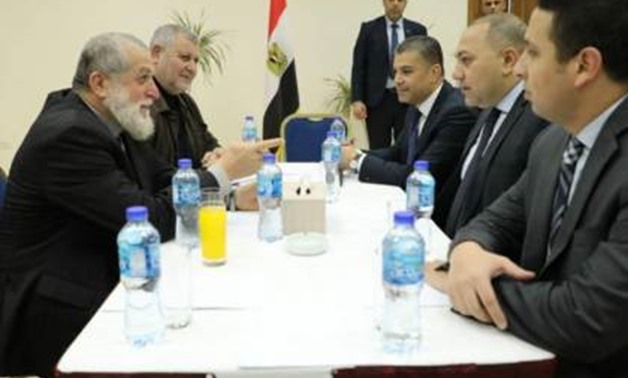
Egyptian delegation continues holding meetings with Palestinian leaders from different parties to ease obstacles banning the reconciliation agreement from being fully implemented – Press Photo
CAIRO – 5 March 2018: A delegation of the Islamic Jihad Movement in Palestine met on Sunday with a high-profile Egyptian security delegation in Gaza to continue discussions over the reconciliation agreement between Palestine’s two main factions, Fatah and Hamas.
A statement issued on Sunday by the Palestinian Islamic Jihad (PIJ) Party said the meeting covered numerous issues, including the humanitarian situation in Gaza and the necessity of overcoming all the current disputes in order to fully implement the reconciliation agreement signed in Cairo October 2017.
The meeting included Palestinian movement leaders Nafez Azzam and Khaled Al-Batsh, along with an Egyptian delegation headed by Major General Sameh Nabil. Both sides stressed the importance of continuing current efforts and even intensifying them during the upcoming period to end the “internal Palestinian rift” between Fatah and Hamas.
The PIJ stressed their complete denial for any move or action that would affect Egypt’s security, stability and sovereignty.
The Egyptian delegation informed the Palestinian leaders of the latest updates regarding easing the tensions between all factions and ending current disputes. The ongoing discussions aim for Palestine to reach a stable and unified political situation.
The Islamic Jihad Movement in Palestine said it aims to establish a sovereign Palestinian Islamic state in line with the geographical boundaries of Mandatory Palestine before 1948. The organization also said it completely rejects the political process and asserts that its objectives can only be achieved through military means.
Egypt’s delegation arrived in Gaza on February 25. Since then, several discussions and meetings were held with other Palestinian leaders from all parties and factions.
The list of separate meetings since the Egyptian delegation’s arrival in Gaza included Palestinian Minster of Transportation Sameh Tubeila, Palestinian Minister of Culture Ihab Bseiso, Head of Hamas’ political bureau Ismail Haniyeh, a number of tribal heads in Gaza, as well as several members of the Palestinian unity government, according to Palestinian media outlets.
The discussions between the Egyptian and Palestinian leaders were previously reported to include the money collected by Hamas leaders in different sectors, including transportation and electricity. During the discussions, Palestine’s Minster of Transportation affirmed that his ministry never received any funds from Hamas regarding transportation. “Since the beginning of the reconciliation, the government has spent about $100 million monthly on education, health and many other services in the Gaza Strip,” Tubeila stated.
Hamas was partly responsible for the electricity problem, because it took over collecting individual and commercial electricity bills that Gazans had to pay to the Fatah government; however, Hamas was not using this money to buy fuel required for keeping the generators going.
The Palestinian Authority also cut employees’ salaries in Gaza and limited travel permits for residents seeking medical services outside the besieged strip. Fatah said it would be prepared to restore the various budgets once Hamas enables the legitimate government to exercise its authority over the strip.
Other points, related to the government control over border crossings, were discussed during the meetings of both sides. In statements to Palestinian Sawa news agency on February 26, Azzam al-Ahmad, a member of the Fatah Central Committee, affirmed that both the Palestinian and Egyptian parties agreed on several things, including banning terrorists from using the Rafah crossing.
“We agreed with the Egyptian authorities two weeks ago not to allow terrorists to use the crossings in Sinai in any way. The suffering of Gaza’s people will not end without ending the dispute between the Palestinian parties, along with opening all crossings, including Rafah,” Ahmad said.
He added that the government will continue doing its job and duties regardless of the challenges and difficulties it may face.
Cairo has played a key role in the reconciliation process between Fatah and Hamas. In October 2017, a reconciliation agreement was signed in Cairo between both parties.
Egypt has opened the Rafah crossing border more than once to allow the passage of humanitarian cases from both sides. The Rafah border crossing is one of the most important crossings between Egypt and Gaza, which is formally under the Gaza authorities’ control.
This crossing is mainly specialized for individual movements across borders, and it was being prepared also acting as a trade route between both countries. The Rafah crossing border's importance increased after Israeli forces destroyed Yasser Arafat International Airport in 2001, which was the only airport allowing Palestinians to travel.
On November 2, 2017, about seven borders in Gaza were handed over to the Palestinian National Reconciliation Government after a long period of conflict between Fatah and Hamas that severely affected their capability to negotiate their cause internationally.
However, after the reconciliation conducted between Fatah and Hamas under Egypt's sponsorship in October, several things changed as the Palestinian factions announced their unity.
The Rafah border crossing might be considered as one of the most important crossings in Gaza, but there are several other crossings that were also handed to the Palestinian National Reconciliation Government.
On September 17, 2017, Hamas announced the dissolution of its administrative committee in the Gaza Strip, inviting the Government of National Reconciliation to assume its duties and hold general elections. The movement affirmed it would comply with the Social Reconciliation Accord signed in 2011.
Since signing the agreement between Fatah and Hamas, several Egyptian delegations have visited Gaza, and vice versa, in order to coordinate implementing all of the agreement’s points and articles; however, a few points still require further discussions between the Palestinian parties.
Palestinian President Mahmoud Abbas said there is no country as vital to the Palestinian cause as Egypt, due to its historical and political position in the region. “Egypt has an opinion, a position and an interest in the Palestinian cause,” said Abbas.


Comments
Leave a Comment